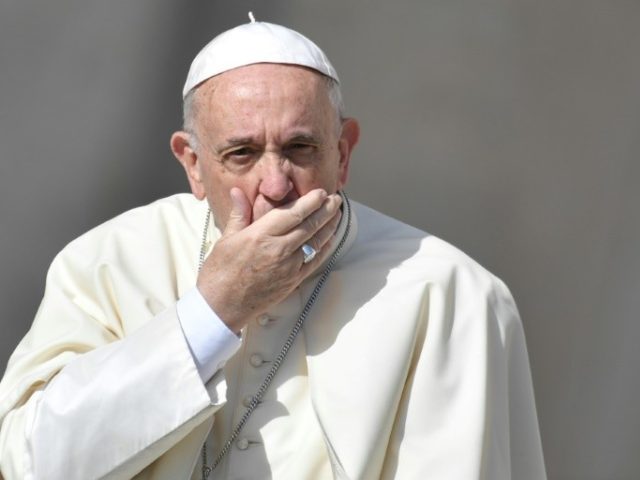Humanity must devise a “long-term global strategy” to meet the problem of climate change, Pope Francis said Saturday, which requires phasing out fossil fuels.
Addressing participants at a meeting for executives in the oil and natural gas sectors, the pope urged his hearers to look to green energy as a key to humanity’s future while continuing to stump for the 2015 Paris Climate Accord.
“As you know, in December 2015, 196 Nations negotiated and adopted the Paris Agreement, with a firm resolve to limit the growth in global warming to below 2° centigrade, based on preindustrial levels, and, if possible, to below 1.5° centigrade,” Francis stated. “Some two-and-a-half years later, carbon dioxide emissions and atmospheric concentrations of greenhouse gases remain very high. This is disturbing and a cause for real concern.”
In what would almost seem an attempt to troll the Trump administration, Francis said that “even more worrying is the continued search for new fossil fuel reserves, whereas the Paris Agreement clearly urged keeping most fossil fuels underground.”
“Civilization requires energy, but energy use must not destroy civilization!” he said.
While correctly noting that “more than one billion people without electricity today need to gain access to it,” the pope rules out affordable fossil fuels, which have been the key to economic development in all first-world countries.
In the very next sentence, in fact, Francis insists that such “energy should also be clean, by a reduction in the systematic use of fossil fuels.”
“Our desire to ensure energy for all must not lead to the undesired effect of a spiral of extreme climate changes due to a catastrophic rise in global temperatures, harsher environments and increased levels of poverty,” he warns.
The pontiff—or his ghost writers—seems to share popular misconceptions regarding climate change, conflating CO2 emissions with air pollution. Air pollution, as the World Health Organization helpfully explains, is measured in the concentration of fine particulate matter in the air we breathe and has nothing to do with carbon dioxide, which is not a pollutant.
Following standard practice, the WHO measures air pollution by the mean annual concentration of fine suspended particles of less than 2.5 microns in diameter. These are the particles that cause diseases of all sorts and are responsible for most deaths by air pollution.
Last fall, the prestigious UK-based Lancet journal revealed that pollution-related diseases were responsible for an estimated 9 million premature deaths in 2015, or some 15 times more than from all wars and other forms of violence combined.
While to date there has not been a single documented case of a person being killed by carbon dioxide related “global warming,” real pollution of air, water and land is killing an average of 25,000 people every day across the globe.
In his address, Francis said that an “energy transition” is urgent to avert “disastrous climate changes that could compromise the well-being and future of the human family and our common home.” In this regard, he said, “it is important that serious efforts be made to transition to a greater use of energy sources that are highly efficient while producing low levels of pollution.”
“This is a challenge of epochal proportions,” Francis continued. “At the same time, it is an immense opportunity to encourage efforts to ensure fuller access to energy by less developed countries, especially in outlying areas, as well as to diversify energy sources and promote the sustainable development of renewable forms of energy.”
Despite earlier efforts to promote debate on climate change and its causes, Francis seems now to take anthropogenic climate change—and indeed a climate “crisis”—to be a incontrovertible fact.
With each month that passes, “the challenge of energy transition becomes more pressing,” he said.
“As we know, everyone is affected by the climate crisis,” he declared. “Yet the effects of climate change are not evenly distributed. It is the poor who suffer most from the ravages of global warming, with increasing disruption in the agricultural sector, water insecurity, and exposure to severe weather events. Many of those who can least afford it are already being forced to leave their homes and migrate to other places that may or may not prove welcoming. Many more will need to do so in the future.”
“The transition to accessible and clean energy is a duty that we owe towards millions of our brothers and sisters around the world, poorer countries and generations yet to come,” he said.
Follow Thomas D. Williams on Twitter Follow @tdwilliamsrome

COMMENTS
Please let us know if you're having issues with commenting.